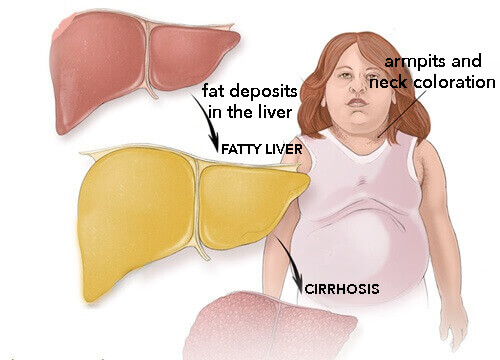Do You Have a Fatty Liver?


Written and verified by psychologist Valeria Sabater
An unhealthy lifestyle, being overweight, or not eating properly are all factors that can lead to a fatty liver.
Experts say that it’s one of the most common diseases of our time, but thankfully, this disease is reversible; by following certain guidelines, we can eliminate excess fat from the liver.
We’ll explain more today on our site. Let’s take a look at some of the most common symptoms, so you’ll be able to take action sooner.
And remember, when in doubt, consult your doctor about any complaints. Your health comes first!
Read also: Liver Cleanse Diet
What is a fatty liver? What causes it?
In medicine, a fatty liver is referred to as “hepatic steatosis”. First, we should point out that it is a benign disease; however, if not treated properly, it can develop into a more serious long-term illness.
Generally speaking, fatty acids and triglycerides accumulate in the liver, causing disease. The liver “shuts down”, and can no longer carry out its metabolic functions or clear toxins as effectively as before.
You should also know that when excess fat accumulates in the liver, the liver suffers small injuries that it attempts to heal. Over time, scar tissue begins to accumulate, resulting in cirrhosis.
Doctors tell us that our livers all contain fat. When the level of fat exceeds 10%, we’re said to be suffering from hepatic steatosis.
This condition can be detected in the blood by the presence of harmful compounds that could not be properly processed by the liver, not to mention the presence of other symptoms like inflammation and discomfort.
What causes a fatty liver?
Many people immediately associate a fatty liver with alcohol or other harmful habits, but this is not always the case. There are other risk factors worth keeping in mind:
- Being overweight or obese.
- Hereditary metabolic disorders.
- The risk of developing a fatty liver is greater over age 50, especially if a poor diet is followed.
- The abuse of certain medications, like anti-inflammatories, pain-killers, aspirin, tamoxifen, and steroids.
- Watch your triglycerides, not getting your bad cholesterol levels under control can lead to a fatty liver.
- Diabetes type II is another common cause.
Read also: Cleanse Your Liver While You Sleep with These 5 Drinks
How do I know if I have a fatty liver?

Many symptoms can be confused with other ailments; however, if any of these symptoms persist for several weeks or you feel that you’re no longer able to lead a normal life and symptoms are interfering with your appetite or performance at work, consult your doctor.
Fatigue
One of the most noticeable signs of a fatty liver or other liver ailment is very pronounced fatigue. It is especially noticeable in the morning: a hard time getting up and finding the energy to start the day. Tiredness may also be more pronounced after meals.
Discomfort
When there’s excess fat in the liver, it causes inflammation and an increase in size. Pains in the abdomen are accompanied by a very characteristic discomfort under the ribs radiating to the back. This pressure evolves into a type of burning pain that feels like a hot plate.
Lack of Appetite
Fatty liver causes a general discomfort resulting in a loss of appetite and digestion becomes slow and heavy, even painful; all of which contribute to alarming weight loss.
The Risk of Cirrhosis
As we mentioned earlier, excess fat on the liver leads to the types of injury and scarring that cause cirrhosis. If left untreated, jaundice will develop, giving our skin and eyes a yellowish appearance.
Another important symptom to be aware of is swelling in the body, legs, and face.
The cause? The liver is no longer able to adequately synthesize proteins and the body offsets this deficit by retaining water.

In conclusion, the presence of excess fat in the liver is a health risk that if not properly treated, can cause more serious problems. Be aware of these symptoms and consult your doctor when necessary.
All cited sources were thoroughly reviewed by our team to ensure their quality, reliability, currency, and validity. The bibliography of this article was considered reliable and of academic or scientific accuracy.
-
Sweet, P. H., Khoo, T., & Nguyen, S. (2017). Nonalcoholic Fatty Liver Disease. Primary Care – Clinics in Office Practice. https://doi.org/10.1016/j.pop.2017.07.003
-
Nierengarten, M. B. (2013). Pediatric nonalcoholic fatty liver disease. Contemporary Pediatrics. https://doi.org/10.1177/0884533613489153
This text is provided for informational purposes only and does not replace consultation with a professional. If in doubt, consult your specialist.








